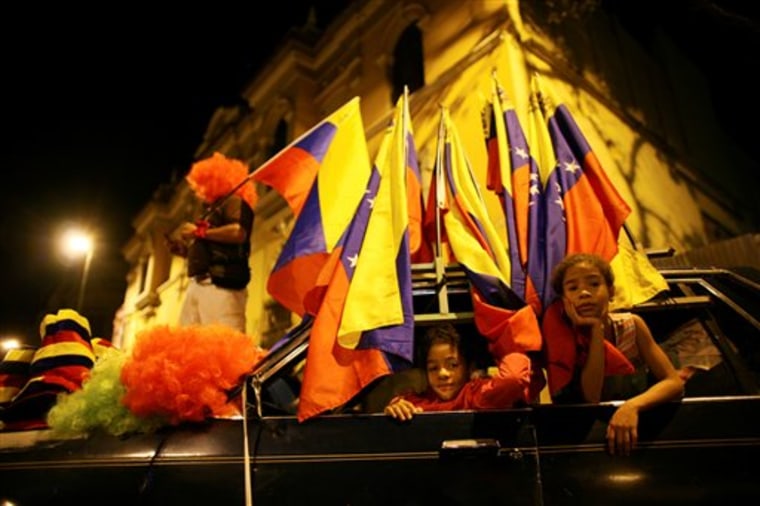President Hugo Chavez said Monday that allies' victories in state and local elections mean Venezuelans want him to press ahead with his socialist policies, but his opponents gained ground by winning the two largest states and two largest cities.
Chavez was jubilant at the results early Monday.
"The people are telling me: 'Chavez continue down the same road,'" said the president whose "21st century socialism" has seen him nationalize key industries and centralize authority while building an anti-U.S. alliance with leftist friends such as Cuba.
He also hinted at a renewed effort to make constitutional changes that could expand his powers and let him run for re-election indefinitely.
Voters last year rejected the president's proposed overhaul of the constitution, which would have abolished term limits that prevent him from running in 2012.
Pro-Chavez candidates held on to gubernatorial posts in 17 states in Sunday's vote, including Chavez's home state of Barinas, where his brother survived a tough race to succeed their father as governor.
But the oft-battered opposition also gained by winning five of the 23 states, including the two biggest — Miranda and Zulia — as well as mayoral races in the two largest cities, Caracas and Maracaibo.
Both sides declare victory
The mixed result offered a rare situation in Venezuela's polarized politics: Both sides said they were pleased.
Opposition candidate Antonio Ledezma defeated a close Chavez confidant to become the next mayor of Caracas, the capital, while the most prominent anti-Chavez politician, Manuel Rosales, beat a Chavez ally in the second-largest city, Maracaibo.
"What's important is that the map of Venezuela has started to change," Rosales said.
The opposition also won governorships in Nueva Esparta, Carabobo and Tachira states.
Some voters in Caracas said they support Chavez on some issues but are dissatisfied with the city's rampant crime, trash and crumbling infrastructure.
Cesar Oliveros, a 48-year-old telecommunications technician, said he backed Ledezma because he saw him as the best option for improving the city, saying some of Chavez's allies "do things halfway" and don't do a good job as administrators.
Support in poorer, rural states
Many Chavez supporters, however, followed the party line and voted for the president's chosen candidates.
His dominance was especially apparent in poorer, rural states, while the opposition seemed to fare best in the affluent cities.
Chavez party spokesman Alberto Muller played down the opposition's resurgence.
"We are the country's foremost political force," Muller said, flanked by other red-clad Chavez allies. "We don't see an opposition victory on a political map painted red."
In 2004 state elections, Chavez allies swept all but two of 23 governorships and a majority of local offices.
After a decade in office, the president still enjoys solid popularity, but last year's defeat of his attempt to scrap term limits energized the opposition, which has also sought to capitalize on complaints about unchecked corruption, deteriorating public services and inflation that has topped 35 percent in Caracas.
